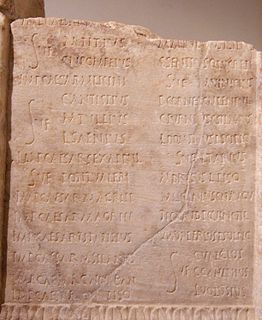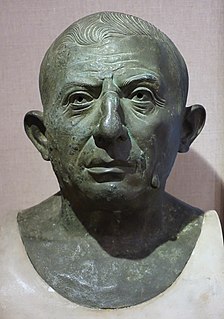Related Research Articles

The gens Julia was one of the most ancient patrician families in ancient Rome. Members of the gens attained the highest dignities of the state in the earliest times of the Republic. The first of the family to obtain the consulship was Gaius Julius Iulus in 489 BC. The gens is perhaps best known, however, for Gaius Julius Caesar, the dictator and grand uncle of the emperor Augustus, through whom the name was passed to the so-called Julio-Claudian dynasty of the first century AD. The nomen Julius became very common in imperial times, as the descendants of persons enrolled as citizens under the early emperors began to make their mark in history.

The gens Aemilia, originally written Aimilia, was one of the greatest patrician families at ancient Rome. The gens was of great antiquity, and claimed descent from Numa Pompilius, the second King of Rome. Its members held the highest offices of the state, from the early decades of the Republic to imperial times. The Aemilii were almost certainly one of the gentes maiores, the most important of the patrician families. Their name was associated with three major roads, an administrative region of Italy, and the Basilica Aemilia at Rome.
The gens Baebia was a plebeian family at ancient Rome. The first member of the gens who obtained the consulship was Gnaeus Baebius Tamphilus, in 182 BC. During the later Republic, the Baebii were frequently connected with the patrician family of the Aemilii.

The gens Aurelia was a plebeian family at ancient Rome, which flourished from the third century BC to the latest period of the Empire. The first of the Aurelian gens to obtain the consulship was Gaius Aurelius Cotta in 252 BC. From then to the end of the Republic, the Aurelii supplied many distinguished statesmen, before entering a period of relative obscurity under the early emperors. In the latter part of the first century, a family of the Aurelii rose to prominence, obtaining patrician status, and eventually the throne itself. A series of emperors belonged to this family, through birth or adoption, including Marcus Aurelius and the members of the Severan dynasty.

The gens Licinia was a celebrated plebeian family at ancient Rome, which appears from the earliest days of the Republic until imperial times, and which eventually obtained the imperial dignity. The first of the gens to obtain the consulship was Gaius Licinius Calvus Stolo, who, as tribune of the plebs from 376 to 367 BC, prevented the election of any of the annual magistrates, until the patricians acquiesced to the passage of the lex Licinia Sextia, or Licinian Rogations. This law, named for Licinius and his colleague, Lucius Sextius, opened the consulship for the first time to the plebeians. Licinius himself was subsequently elected consul in 364 and 361 BC, and from this time, the Licinii became one of the most illustrious gentes in the Republic.

The gens Junia was one of the most celebrated families of ancient Rome. The gens may originally have been patrician, and was already prominent in the last days of the Roman monarchy. Lucius Junius Brutus was the nephew of Lucius Tarquinius Superbus, the seventh and last King of Rome, and on the expulsion of Tarquin in 509 BC, he became one of the first consuls of the Roman Republic.

The gens Cornelia was one of the greatest patrician houses at ancient Rome. For more than seven hundred years, from the early decades of the Republic to the third century AD, the Cornelii produced more eminent statesmen and generals than any other gens. At least seventy-five consuls under the Republic were members of this family, beginning with Servius Cornelius Maluginensis in 485 BC. Together with the Aemilii, Claudii, Fabii, Manlii, and Valerii, the Cornelii were almost certainly numbered among the gentes maiores, the most important and powerful families of Rome, who for centuries dominated the Republican magistracies. All of the major branches of the Cornelian gens were patrician, but there were also plebeian Cornelii, at least some of whom were descended from freedmen.

The Julii Caesares were the most illustrious family of the patrician gens Julia. The family first appears in history during the Second Punic War, when Sextus Julius Caesar was praetor in Sicily. His son, Sextus Julius Caesar, obtained the consulship in 157 BC; but the most famous descendant of this stirps is Gaius Julius Caesar, a general who conquered Gaul and became the undisputed master of Rome following the Civil War. Having been granted dictatorial power by the Roman Senate and instituting a number of political and social reforms, he was assassinated in 44 BC. After overcoming several rivals, Caesar's adopted son and heir, Gaius Julius Caesar Octavianus, was proclaimed Augustus by the senate, inaugurating what became the Julio-Claudian line of Roman emperors.
The gens Terentia was a plebeian family at ancient Rome. Dionysius mentions a Gaius Terentilius Arsa, tribune of the plebs in 462 BC, but Livy calls him Terentilius, and from inscriptions this would seem to be a separate gens. No other Terentii appear in history until the time of the Second Punic War. Gaius Terentius Varro, one of the Roman commanders at the Battle of Cannae in 216 BC, was the first to hold the consulship. Members of this family are found as late as the third century AD.

The gens Minucia was an ancient Roman family, which flourished from the earliest days of the Republic until imperial times. The gens was apparently of patrician origin, but was better known by its plebeian branches. The first of the Minucii to hold the consulship was Marcus Minucius Augurinus, elected consul in 497 BC.

The gens Porcia, rarely written Portia, was a plebeian family at Ancient Rome. Its members first appear in history during the third century BC. The first of the gens to achieve the consulship was Marcus Porcius Cato in 195 BC, and from then until imperial times, the Porcii regularly occupied the highest offices of the Roman state.

The gens Antistia, sometimes written Antestia on coins, was a plebeian family at ancient Rome. The first of the gens to achieve prominence was Sextus Antistius, tribune of the plebs in 422 BC.

The gens Caecilia was a plebeian family at ancient Rome. Members of this gens are mentioned in history as early as the fifth century BC, but the first of the Caecilii who obtained the consulship was Lucius Caecilius Metellus Denter, in 284 BC. The Caecilii Metelli were one of the most powerful families of the late Republic, from the decades before the First Punic War down to the time of Augustus.
The gens Sextia was a plebeian family at ancient Rome, from the time of the early Republic and continuing into imperial times. The most famous member of the gens was Lucius Sextius Lateranus, who as tribune of the plebs from 376 to 367 BC, prevented the election of the annual magistrates, until the passage of the lex Licinia Sextia, otherwise known as the "Licinian Rogations," in the latter year. This law, brought forward by Sextius and his colleague, Gaius Licinius Calvus, opened the consulship to the plebeians, and in the following year Sextius was elected the first plebeian consul. Despite the antiquity of the family, only one other member obtained the consulship during the time of the Republic. Their name occurs more often in the consular fasti under the Empire.
Sextus Julius Caesar was a Roman statesman, and the first member of the Julii Caesares to hold the consulship, which he attained in 157 BC.
Sextus Julius Caesar was a Roman praetor in 208 BC, during the Second Punic War. He is thought to be the ancestor of all of the later Julii Caesares who appear in history.
Sextus Julius Caesar was a Roman statesman, who held the consulship in 91 BC. He died during the Social War. He was the uncle of Gaius Julius Caesar, the dictator.
The gens Hortensia was an ancient plebeian family in Rome. Members of this gens are first mentioned in the fifth century BC, but from that time somewhat infrequently until the final century of the Republic. The most illustrious of the gens was the orator Quintus Hortensius, a man of great learning, and a contemporary of Cicero. Under the Empire they seem to have sunk back into obscurity.
The gens Oppia was an ancient Roman family, known from the first century of the Republic down to imperial times. The gens may originally have been patrician, as they supplied priestesses to the College of Vestals at a very early date, but all of the Oppii known to history were plebeians. None of them obtained the consulship until imperial times.
The gens Roscia, probably the same as Ruscia, was a plebeian family at ancient Rome. Members of this gens are mentioned as early as the fifth century BC, but after this time they vanish into obscurity until the final century of the Republic. A number of Roscii rose to prominence in imperial times, with some attaining the consulship from the first to the third centuries.